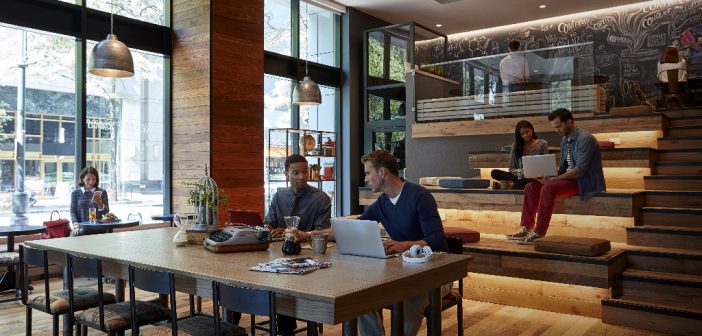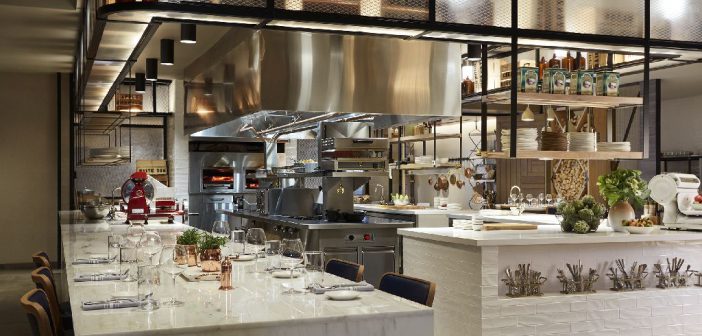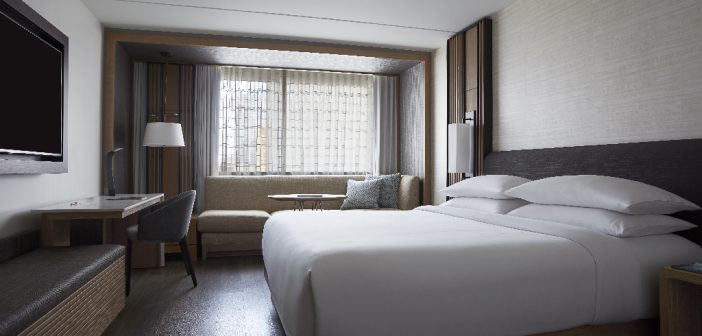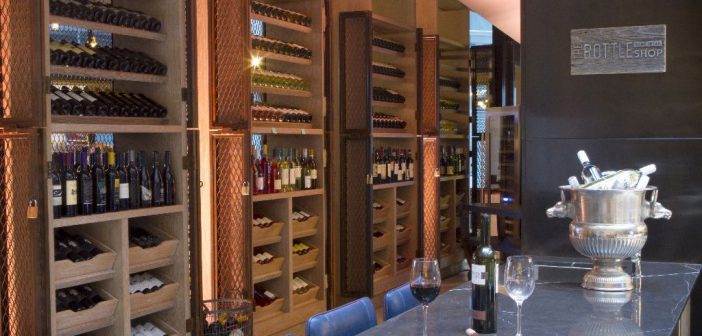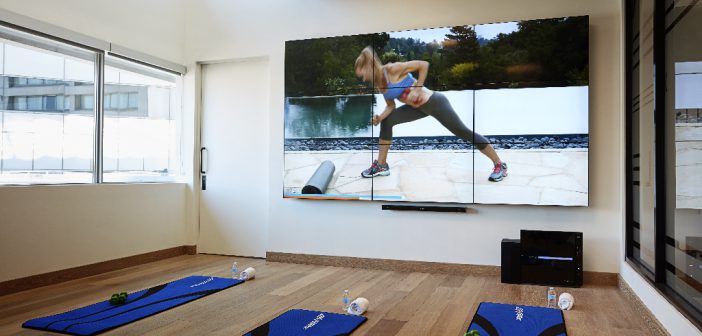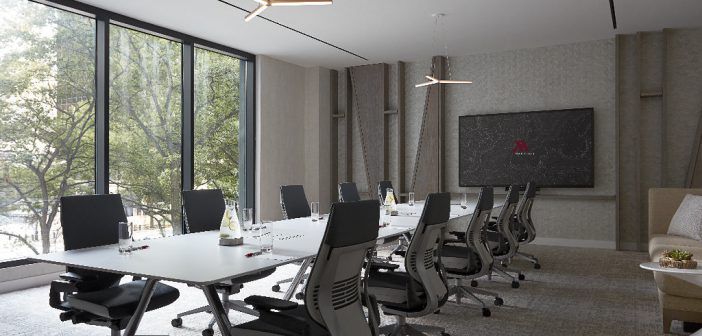An inside look at the world’s first hotel in live beta, M Beta at Charlotte Marriott City Center.
By Alicia Hoisington
Marriott’s M Beta at Charlotte Marriott City Center in North Carolina, an innovation lab that functions as the world’s first hotel in live beta, is on the leading edge of testing new ideas in the hotel experience and requesting guest feedback to further its innovative brand transformation.
“The Marriott Hotels brand has been on a transformation journey, and innovation is in our DNA,” says Mike Dearing, managing director of Marriott Hotels. “M Beta is a great opportunity to signal to all stakeholders that we are very much focused on bringing an innovative approach to the Marriott brand and worldwide.”
Dearing says the Charlotte Marriott City Center Hotel, built in 1984, was chosen as the beta location due to its own transformation. The hotel itself was a “standard and uninspiring” Marriott hotel, he says, so it was a great opportunity to reinvent the property as well as the experience to mirror the transformation of the Marriott Hotels brand at large.
Marriott purchased the hotel in 2013 solely for this purpose, a move Dearing says was rare.
“The vast majority of [Marriott] hotels are owned by others. We invested our own capital to buy the hotel and fully renovate it,” he says. “We wanted to show the world that this is our innovative approach, and we brought everything we had in terms of ideas for it… to signal to the world that this is what we mean by reinvention.”
The M Beta hotel held its grand opening in October. As a way to gauge consumer feedback, physical Beta Buttons were located throughout the hotel with a live-tally, allowing for real-time customer feedback. By pushing a button, guests could share their approval for the innovation connected to the button. Beta Button engagement, votes and feedback were then aggregated and brought to life in real-time via digital screens, or Beta Boards, placed throughout the hotel.
Talking tech
Technology is a fundamental part of the innovative hotel, not just to acquire consumer feedback but to ramp up the guest experience.
“Technology is really the core to competitive advantage,” Dearing says.
He says the Marriott team integrated guest-facing technology into many aspects of the hotel, including:
Interactive fitness center
The Beta Hotel takes the hotel gym to the next level with an on-demand fitness delivery. In the on-demand fitness studio, an entire wall of high-definition TVs shows a larger-than-life fitness instructor teaching workouts to guests. More than 600 workouts can be delivered on the HD TV monitors. The hotel’s original pool was filled in to make room for this interactive fitness studio.
“We learned that high-tech delivery with on-demand fitness fits with what our guests want,” Dearing says. “They want options.”
Modern guestrooms
The Beta Hotel was the first Marriott property to introduce the concept of Marriott Modern guestrooms. These rooms were designed for today’s travelers who bring three to four devices with them on their journeys. USB plugs are placed throughout the room, and the guestroom furniture is set up so guests can work in flexible spaces.
“We learned from talking to thousands of next-gen guests that they work mobile and flexible,” Dearing says. “They need spaces to do focused work or they want to sit on the bed and work comfortably. They might want to do relaxed work on their iPad or stream Netflix.”
Dearing says the modern guestroom prototype is at the heart of the Marriott Hotels transformation and will be incorporated into new and renovated hotels worldwide.
Keyless entry
Guests can check in via the mobile app on their smart phones. Their handheld devices become their room keys, and they can bypass traditional check-in to go straight to their rooms.
In-room entertainment
Guestroom flat-screen TVs come loaded with a curated selection of TED videos for more on-demand entertainment and content options.
Next-gen meeting space
The focus in meeting rooms is flexible, Dearing says. With aspects such as movable walls and modular furniture, groups can have meetings that cater to them. But technology is an even bigger part of that flexibility. Slim-bezel LED TVs, interactive touch screen signage and professional monitors become major focuses of meeting rooms.
LG Studio
A high-tech kitchen is located on the second level within the hotel’s meeting space. Equipped with the latest LG appliances, this full kitchen allows for learning opportunities and more engaged meetings that lend themselves to unique food and beverage experiences.
“It enhances the level of [meeting]retention because it gets broken up by fun and different F&B experiences,” Dearing says.
High-tech M Club
Marriott’s M Club Lounge was relocated from guestroom floors to be a central focus in the lobby. The club is equipped with many high-tech options for guests to enjoy, including a 79-inch 4K Ultra HD TV and computers complete with two 34-inch “UltraWide” 21:9 desktop monitors. Dearing says the new M Club concept is being rolled out system-wide, with 30 open and 50 in the pipeline.
Social media’s role
A big part of the hotel is that it’s rooted in the local marketplace. That’s why Marriott continuously reached out to local influencers early on in the process to make sure they were engaged and to create a real conversation about the property. A hash tag, #DesignCharlotte, was created to highlight the city before the hotel came along, but Marriott made sure to join in on the conversation.
“In the roadmap we have for reinventing and re-launching, social channels are a big part of that,” Dearing says.
The innovation never stops
While technology plays a huge role in Marriott’s innovative ideas, it doesn’t stop there. The Beta Hotel offers many other innovations that are helping to shape the brand worldwide.
Dearing says the hosted arrival experience, along with digital check-in, also helps guests who want to bypass the front desk. Personal greeters wait for guests to arrive in many areas of the hotel: at the curb, in the lobby and on the go. The arrival technique helps busy travelers to expedite the check-in process.
“Or if guests want more interaction or want to learn more about the local area and hotel, an associate host can take them to their guestroom and introduce them to all the features of the room,” Dearing says.
Additionally, the hotel’s F&B experiences continue to innovate with the Immersive Kitchen at Stoke Restaurant. The walls between the kitchen and dining area can be removed so the Immersive Kitchen puts guests in the center of the action. Chefs can interact closely with guests and entertain them with impromptu culinary offerings. The interactive space also encourages a sense of exploration among guests due to a regular rotation of local artisan tastings and cooking classes.
A localized marketplace also is key to the innovation at the hotel. Coco and the Director is a community center and social hub of the property. Guests can enjoy locally sourced coffee, unique retail and limited-edition food selections from small businesses in Charlotte. The hub features an ongoing rotation of literary, music, educational and entertainment events for guests and locals.
The local marketplace also is brought into the lobby, with local artisans selling their products on portal carts. Dearing says these artisans allow a “wonderful opportunity” for guests and locals to interact and come into contact with local vendors.
He says the Marriott team learned a lot from launching these innovations.
“We had such great ideas, and you don’t know if they will work until you try them,” he says, adding that every innovation introduced turned out to be successful.
Dearing says the team was especially pleased to find success with innovations they had never attempted before, such as wine sold at regular prices in the retail space. It resonated well with locals, who would stop by from businesses offices to purchase wine.
“We were surprised at how well we read the local market,” he says. “What we ideally wanted was for the hotel to be knitted into the local community and be a valuable part of daily life. And that’s what we’ve seen. It confirmed our hopes and expectations.” ■
8 things to learn from Marriott’s innovative spirit
“The marketplace evolves so rapidly in terms of taste and needs of guests and what competitors are doing,” says Mike Dearing, managing director of Marriott Hotels. “You need to constantly evolve and stay in tune to what guests want in order to compete. It’s the key to being successful and delivering experiences.”
Following are eight things hoteliers can learn from Marriott’s innovations:
1: Stay connected
Listen to what your guests want. Solicit feedback from them however you can, and innovate around what they tell you. Reach out to locals and influencers to discover what they would like to see from your hotel. Once you get feedback, don’t rest on your laurels. Continue to acquire feedback. Remember that wants and needs are constantly changing, so you need to always be listening and innovating to keep up with the competition.2: Try, try again
The Marriott team brought a lot of innovative ideas to the table when developing the M Beta Hotel. While they weren’t sure all the ideas would work, they weren’t afraid to try. Success and failure are never final. If something works great, implement it to work for you. If something doesn’t work as planned, don’t be afraid to try again or attempt a new approach.3: Be social
Social media is a great tool to learn what your guests are talking about. You can gather feedback on these channels, but also you can join conversations. Look for local hashtags that relate to your hotel and innovations, and join in for a great way to authentically market your hotel as well as talk about what you are doing to stay relevant to your audience.4: Provide options
While trends are broad, people are not so generalized. You need to provide options for guests. For example, some guests want to work out in a gym with others while some might enjoy the privacy of their own rooms. Offer great ways to do both.5: Think tech
Technology isn’t going away – it’s only becoming more advanced. Guests want technology as good as what they have at home, if not better. Your hotel won’t be ahead of the competition if your tech is outdated. Invest in updating technology at your hotel and keep on top of the latest to determine how you need to keep innovating.6: Be flexible
The way you think about innovation shouldn’t be stagnant. As Dearing says, Marriott’s approach to innovation 10 years ago wouldn’t be nearly as successful as what the company is doing today. Trends and ways of thinking are always changing. You should be, too.7: Look to F&B
If you’re unsure of where to start in your innovation journey, low-hanging fruit could lie in your food and beverage department. This area of the hotel has a great opportunity to connect to a local community and begin to build its relevance.8: Take a collaborative approach
Two heads are better than one. Gather your teams together to get their thoughts on innovative ideas for the hotel. Those in the trenches often have the greatest insights, and chances are they have been thinking about ways to change for the better.
Innovation at large
Marriott Hotels isn’t the only brand that has its sights set on innovation. In January, Marriott International launched its first pop-up hotel innovation lab to crowd source real-time feedback from the public. The lab allowed people to experience enhancements being considered for the future of the company’s innovation incubator brand Aloft, and eco-conscious, extended-stay brand Element.
- Element is piloting a new guestroom design that will feature a communal room in the center of four guestrooms. Travelers can share a kitchen, dining room and lounge area. This will provide more collaborative space for groups who would like to spend time together in a more private setting.
- Aloft will be revitalizing its food and beverage program to emphasize fresh, healthy ingredients such as spinach, quinoa and avocado. Travelers can order customized “pots,” a healthy meal in a colorful to-go container with food that reflects regional tastes. A personalized pot can be ordered and paid for at a digital kiosk. Guests will receive their pot with a time-stamped label featuring their chef’s emoji.
- Tech-centric beverage concepts will be a focus of the Element brand. For example, a portable wine cart will automatically pour wine when activated by a guest’s hotel room key card.
The pop-up lab came four months after Marriott acquired Starwood Hotels & Resorts Worldwide, which founded the Aloft and Element brands. At year-end 2016, there were 116 Aloft and 23 Element hotels open around the world, with 150 Aloft and 73 Element hotels in the pipeline globally.

